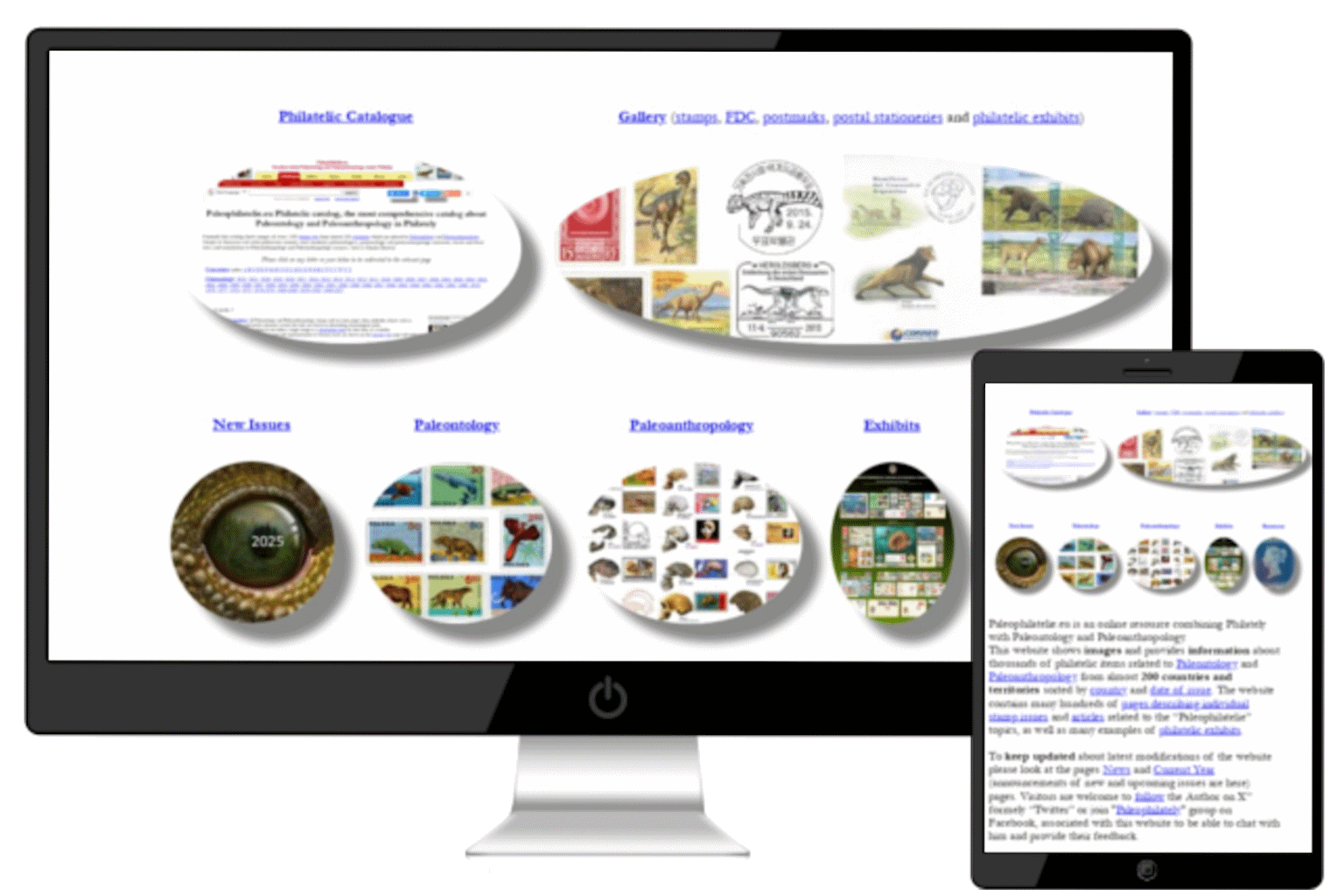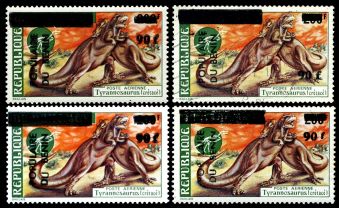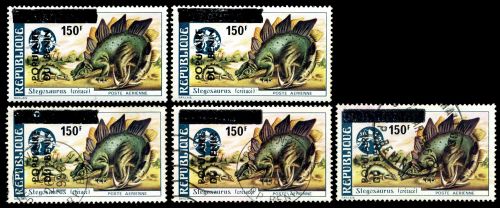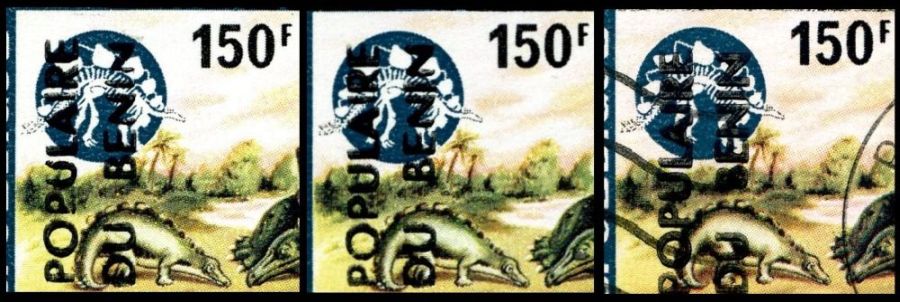Benin/Dahomey
Dinosaurs and other prehistoric animals on stamps and postmarks of Benin and Dahomey
Contents:
Benin, formerly
Dahomey, is a country in West Africa.
It is bordered by
Togo to the west,
Nigeria to the east, and Burkina Faso and
Niger to the north.
A majority of the population live on its small southern coastline on the
Bight of Benin, part of the Gulf of
Guinea in the northernmost tropical
portion of the Atlantic Ocean.
The capital of Benin is Porto-Novo, but the seat of government is in Cotonou, the country's largest city and
economic capital.
Benin covers an area of approximately 115,000 square kilometers, with a population of approximately 9.98 million.
Benin is a tropical, sub-Saharan nation, highly dependent on agriculture, with
substantial employment and income arising from subsistence farming.
The official language of Benin is French.
However, indigenous languages such as Fon and Yoruba are commonly spoken.
The most significant religions in Benin include Roman Catholicism, followed closely by Islam,
Vodun, and Protestantism.
This region was referred to as the Slave Coast from as early as the 17th century due to the large number
of slaves shipped to the New World during the Trans-Atlantic slave trade.
After slavery was abolished,
France took over the country and renamed it French Dahomey.
In 1960, Dahomey gained full independence from France, and had a tumultuous period with many different democratic
governments, many military coups and military governments.
A Marxist–Leninist state called the
People's Republic of Benin existed between 1975 and 1990.
In
1991, it was replaced by the current multi-party
Republic of Benin.
[R1]
Stamps inscribed Dahomey were issued between 1899 and 1942.
From them until 1960, the stamps of French West Africa were used but Dahomey-specific stamps were on sale again from 1960.
Even when the country name was changed to Benin in 1975, many of Dahomey stamps were reused, by overprint country name and face value,
as shown below. Some of these overprinted stamps are rare and expensive, other are common.
[R2]
Official stamps of Dahomey related to Paleontology: dinosaurs and other prehistoric animals
| 23.09.1974 "Prehistoric animals" |
|
Old stamps of Dahomey can be still purchased at post offices in Benin
and can be even used to pay postage as shown on the example below. |
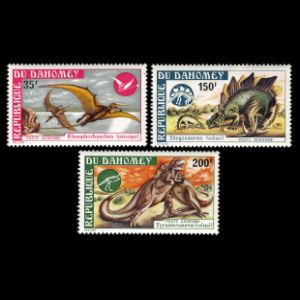 |
|
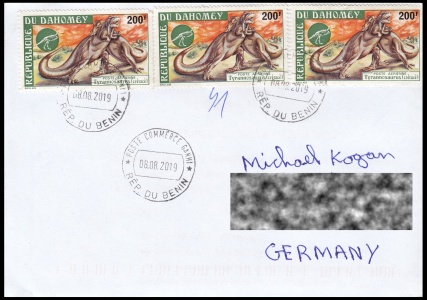 |
Official stamps of Benin related to Paleontology: dinosaurs and other prehistoric animals
| 14.12.1984 "Dinosaurs" |
??.08.1985 "Dinosaurs" [1] |
??.??.1994 "Dinosaurs" |
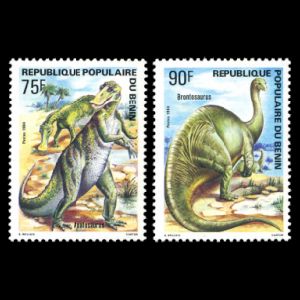 |
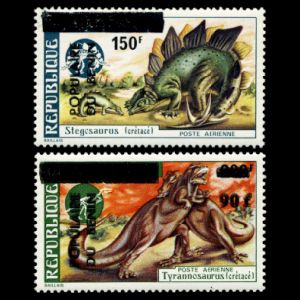
|
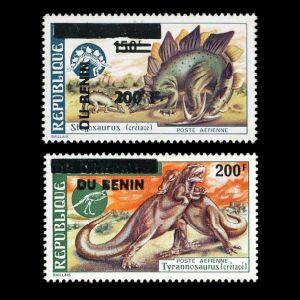 |
|
| ??.??.1995 "Rhamphorhynchus" |
30.08.1996 "Prehistoric animals" |
25.07.1998 "Dinosaurs" |
 |
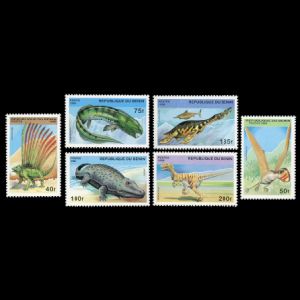 |
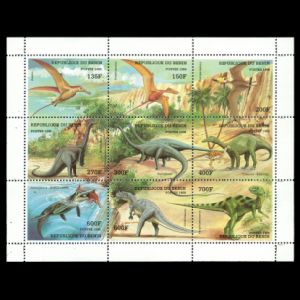 |
|
| ??.??.2000 "Prehistoric animals" [2] |
??.12.2008 "Tyrannosaurus" |
??.04.2009 "Stegosaurus" |
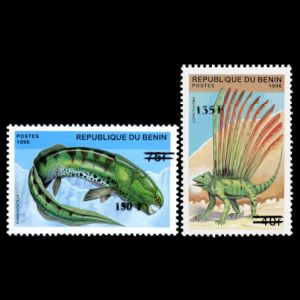 |
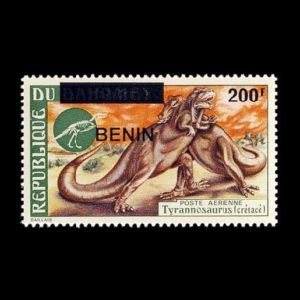 |
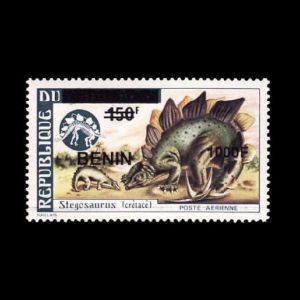 |
|
| 2019 (?) "Prehistoric animals" - FORGERY [3] |
|
|
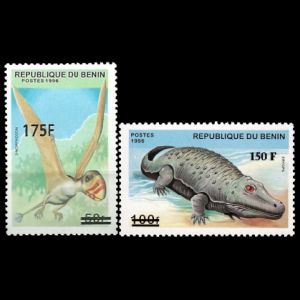 |
|
Notes:
[1] Overprint of
Dahomey stamp from 1974, the only Dahomey's stamps set related to Paleontology.
There are many variation of overprinted stamps,
differentiated by position of country name on the left side and position of new face value on the top.
[R3]
Here (on the right) are some examples of shifted text on stamps of Stegosaurus.
[2] Overprinted stamps from "Prehistoric animals" stamps from 1996.
The stamp of Longisquama is very rare.
The Dunkleosteus stamp is also rare, but was still available in post offices
in Benin even in 2018 and can still be used for postage.
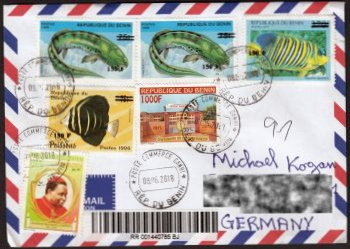
Similar to overprinted stamps from 1985 these stamps also have many variations
of surcharged text as shown on the right.
In recent years, more overprinted stamps from the 1996 set have appeared on auction sites l
ike ebay and delcampe.
Their origin and year of issue is not known at this time.
|
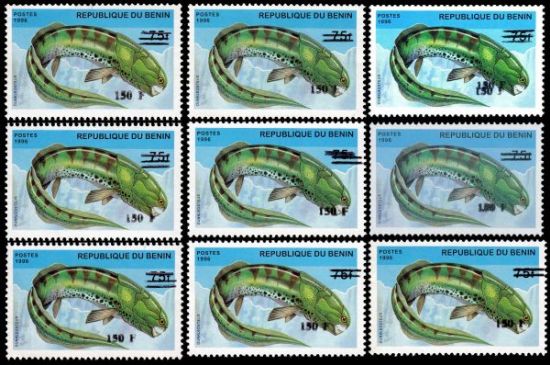
|
[3] These three overprinted stamps from the set of six "prehistoric animal" stamps from 1996,
appeared on the Internet in 2019.
They look very similar to two other overprinted stamps of the same set, overprinted in 2000.
No one of the major catalogues listed them till to date (2024) and some local collectors claim these stamps
were surcharged by somebody not related to the Post.
Please be aware, these stamps are
most likely FORGERY.
Commemorative postmarks of Benin that related to Paleontology: prehistoric animals
Legend is here
| 30.08.1996 "Prehistoric animals" [FDC] |
25.07.1998 "Prehistoric animals" [FDC] |
|
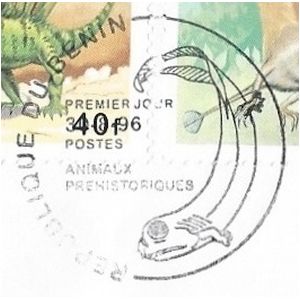 |
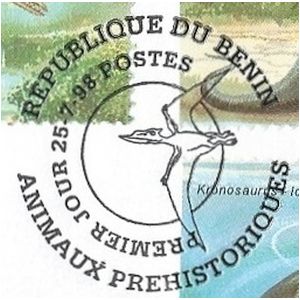 |

|
References:
- [R1] Benin:
Wikipedia,
WikiTravel,
FlagCounter.
- [R2] Postal History and Philately of Benin:
Wikipedia,
Links to official website of the Post Authority, stamp catalog and a list of new stamps of Benin are herj.
- [R3] Overprint variations of Benin dinosaur stamps from 1985:
stampedout.nl.
Acknowledgements:
Many thanks to
Dr.
Peter Voice from Department of Geological and Environmental Sciences, Western Michigan University,
for reviewing the draft page and his very valuable comments.
